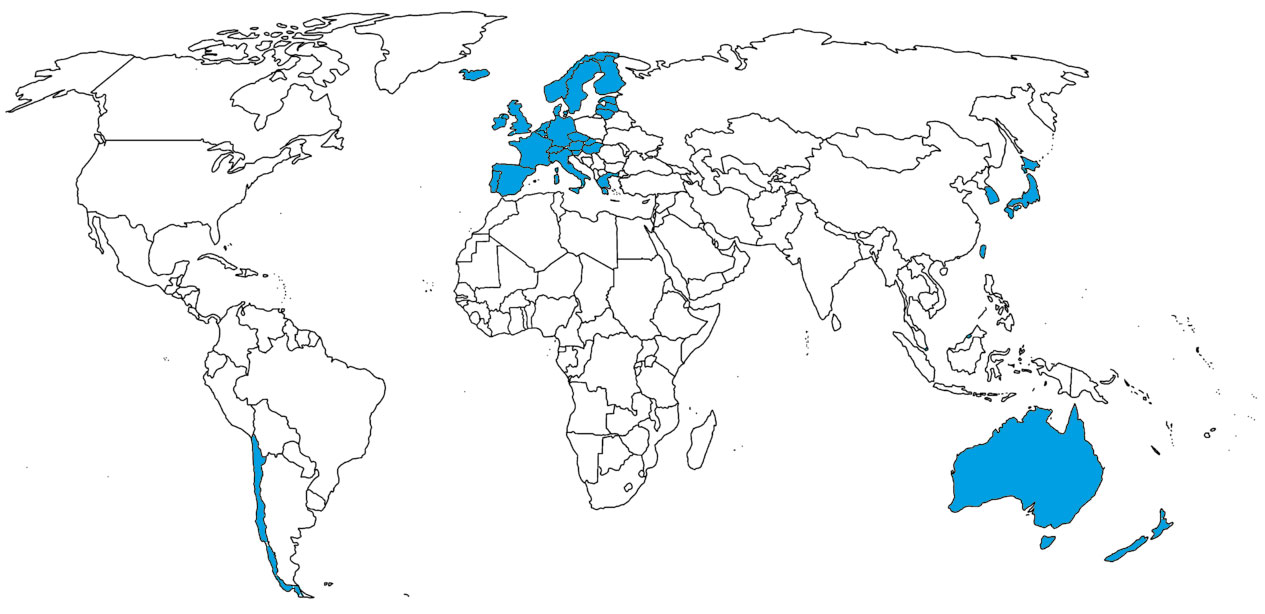Concerns with the Visa Waiver Program
-
Nearly 20 million travelers entered the U.S. under the Visa Waiver Program in 2013.
-
The Visa Waiver Program relies on intelligence sharing and systems like the “no-fly list” to screen applicants. Reliability of these programs has been called into question.
The Visa Waiver Program allows citizens from participating countries to enter the U.S. as temporary visitors for business or tourism without first obtaining a visa from a U.S. consulate abroad. Currently, 38 countries participate. In 2013, nearly 20 million travelers entered the U.S. under the program.
Countries Participating in the U.S. Visa Waiver Program

In order to participate in the VWP, countries must meet several requirements. Among other things, countries must:
- share criminal and security information with the United States;
- share information on lost or stolen passports through INTERPOL; and
- issue tamper-resistant, machine-readable, e-passports that incorporate biometric identifiers such as photo and fingerprints.
A country can be removed from the program if it fails to comply with these or other requirements.
Security Screening under the VWP
The security screening process for the VWP differs from a traditional travel visa in the timing of a traveler’s first contact with a U.S. official. Before obtaining a visa to travel to the U.S., citizens must normally visit a U.S. embassy or consulate in their country of origin for an in-person interview and biometric screening through security databases. In the VWP, this does not occur until the traveler has entered the U.S.
Before VWP travelers can buy a ticket to travel to the United States, they must submit biographic information – such as name, date of birth, and passport information – online to the Electronic System for Travel Authorization. This system vets the information through law enforcement and intelligence databases, including the Terrorist Screening Database, no-fly list, Terrorist Identities Datamart Environment, and INTERPOL Lost and Stolen Passport Database. At this point, there is no independent verification that the applicant is the person claimed. Once an application is filed, the information is processed again every 24 hours for the two years the application is valid. Approval can be revoked at any time if the screening does not come back clean.
Prior to departure to the United States, the VWP traveler’s information is then run through the Department of Homeland Security’s Automated Targeting System, which runs biographic information through intelligence and law enforcement databases according to a series of rule sets that are regularly amended to reflect the current security environment. The ATS screening is run multiple times up until departure. Upon arrival in the U.S., the VWP traveler is then interviewed and subject to biometric screening at the point of entry.
Policy Considerations for the VWP
There is concern that the VWP creates a security loophole by delaying biometric checks and in-person interviews until a person is present in the U.S. Additionally, information provided by a traveler for screening is not independently verified until a traveler attempts to board a flight. There is also concern that DHS does not adequately review country compliance with program mandates. While the department is required to review and report on VWP compliance, a 2012 DHS inspector general report found that the department frequently missed its deadlines. DHS claims that it does not have enough staff to meet these reporting requirements, but that countries’ compliance with the program’s requirements is constantly monitored.
The VWP is supported by the travel industry and other business interests. They argue that the program allows the U.S. to require participating countries to issue more advanced, fraud-resistant passports and to share a broader range of security information than they otherwise would. According to the U.S. Travel Association, VWP visitors generated $190 billion in economic output in 2013. The State Department claims that it would not have the resources to process travel visas for the number of visitors that currently enter through the VWP.
The White House announced Monday that it is making some changes to the VWP to address recent terrorism concerns. DHS will modify the Electronic System for Travel Authorization to capture information regarding applicant travel to “a terrorist safe haven.” It will accelerate the already mandated review of VWP countries and increase assistance to countries “to better facilitate terrorism information sharing.” The FBI director also will evaluate terrorism information sharing between the U.S. and VWP countries. The White House said that it will seek statutory authority from Congress to make additional changes.
Next Article Previous Article
